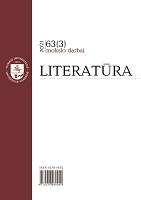Istorinio pasakojimo prielaidos Augustino De civitate Dei
The Premises of Historical Narrative in Augustine’s De civitate Dei
Author(s): Mantas TamošaitisSubject(s): Philosophy of Middle Ages, Philosophy of Religion, Philosophy of History
Published by: Vilniaus Universiteto Leidykla
Keywords: Augustine of Hippo; Saint Augustine; history; time; philosophy of history; historical narrative; historia sacra; City of God; De civitate Dei;
Summary/Abstract: The article examines the problems of history and historical narrative in St. Augustine’s De civitate Dei. The author seeks to reveal the problematic nature of Augustine’s conception of history in the opposition of cyclical and linear conceptions of time. Augustine’s reflection on the phenomenon of history from the perspective of Christian philosophy creates the basis for a modern linear conception of time and history. It is argued that Augustine should be seen as a philosopher-theologian of history, whose thinking on the subject is based on teleological principles and his philosophy of time. It is argued that Augustine’s thinking about history is based on the concept of historia sacra and must be evaluated in the light of the constant distinction between historia sacra and what might be called historia profana or historia saecularis. Since the objectives of historia sacra cannot be realised in earthly life, political transformations in secular history have no eschatological significance. However, Augustine’s conception of history is not cyclical, but has a clear beginning, end, direction and purpose (meaning), which distinguishes its premises from the Greco-Roman conception of history, and it is thus close to the modern conception of history. For Augustine, the coming of Christ is a new and singular event in history, negating any cyclical nature of history and defining the time in which Augustine lived.
Journal: Literatūra
- Issue Year: 63/2021
- Issue No: 3
- Page Range: 8-18
- Page Count: 11
- Language: Lithuanian

